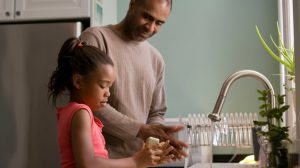Anybody would be forgiven for being anxious and uncertain about what the coming months may bring. For children, that anxiety is real too. While it is a relief that the virus does not seem to make most children unwell, children are aware of the possible impact on them – like schools having to close or family members being at medical risk. Thousands of children are also preparing to take GCSEs and A-Levels, and many will be worried and stressed about the understandable uncertainty, something I know the Government is acutely aware of.
Inevitably, coronavirus is now likely to affect many different aspects of children’s lives. They will be looking to us, the adults, for answers and for reassurance.
In any crisis Governments need to work fast on population wide measures, as they are doing. For the current emergency, the closure of schools is a case in point – it is likely to have the biggest impact on children and families and it is right and proper that measures are taken that work for the vast majority of children. But there are also going to be groups of children who are going to have particular circumstances that will need to be accounted for – like the children who don’t have a laptop or broadband at home, the children who don’t have the space or the environment at home that is conducive to work, the children who live in families who have complex problems of their own that means that homelife can be chaotic and unpredictable. And the millions of children in low income households who rely on their free school meals every day.
At the most basic level, schools also provide childcare during the day – if that goes, there will be children left on their own because there are bound to be families where parents feel unable to take time off work. If schools are a protective factor for these vulnerable children, then the next few months could leave many thousands at greater risk. These are the children we need to ensure are being thought of and supported as we tackle the impact of coronavirus. What will be needed to ensure these vulnerable children don’t slip through the net, that they are identified and that those who were already at risk are protected? They must not slip from view as attention is rightly focused on tackling the enormous public health challenges ahead.
The arrangements for children in care are of particular concern. I have written to the Departments for Education and for Communities and Local Government asking them to make clear how much of the £5bn funding announced at the Budget for supporting public services in their response to COVID-19 is being allocated to children’s social care. I have asked the Government for reassurance that councils are preparing for shortages of staff in children’s homes and among foster carers as more people become unwell. Social workers will also become unwell, meaning the hundreds of thousands of children who are not in care but who rely on social workers, family workers and others for help may not get the support they need.
The spotlight has been on older teenage children in care, living in semi-independent accommodation over recent months – those children will be as vulnerable now as they were before, with the added concerns about coronavirus. It is important they are kept informed and supported by local authorities.
The stark reality is that the situation for many of the most vulnerable children could get worse over coming months as the economic impact of the virus kicks in. There will be children whose parents could lose their jobs or income in the coming weeks, some of them already living in families struggling with poverty. It is vital that the benefits system is able to respond quickly to protect their needs.
All of these scenarios demand careful consideration and detailed planning as part of the Government’s response to coronavirus. This is a huge challenge at every level, but the test of our success will be the ability to continue to support our most vulnerable children.
Of course we do also need to think about how we explain what is going on to children. Our first instinct is often to want to shield them, but it rarely works because they will hear things from other children or see the constant news headlines on TV or online. For most families, being able to talk about what is happening will actually help children who are feeling anxious. BBC Newsround is doing a great job with excellent films which help answer many of the questions children are raising. Be open and honest, stick to the facts and don’t over complicate. Listen to what children have to say and reassure them that they themselves are safe.
I have been reassured so far that the Government are aware of the need to protect children. Over the coming weeks and months, I will continue to push them to do all they can and to stand up for children and their rights in Whitehall, not just on COVID-19, but on the many other important issues affecting children that won’t disappear just because much of the focus might be elsewhere.
Last week, the Norwegian Prime Minister gave a press conference where she directly addressed children. It is a sign the Government there see children as not just an important part of society, but also part of the solution to tackling the coronavirus crisis. I know that the machinery of Government here is absolutely focussed on tackling the same huge challenges. It is essential that England’s 12 million children are an integral part of these plans too.
View the NHS website for the latest health information and advice about coronavirus (COVID-19)






